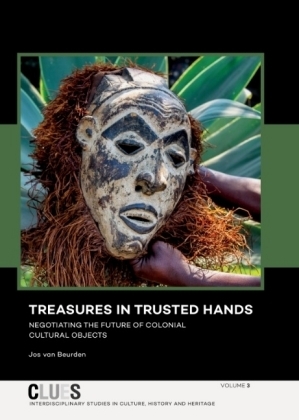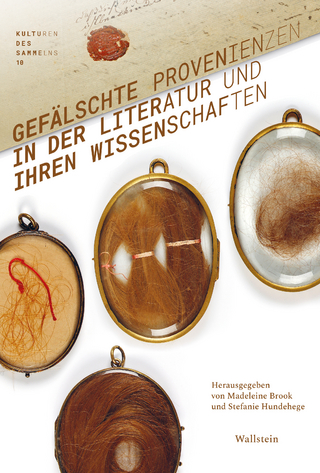
Treasures in Trusted Hands
Sidestone Press (Verlag)
978-90-8890-440-0 (ISBN)
This pioneering study charts the one-way traffic of cultural and historical objects during five centuries of European colonialism. It presents abundant examples of disappeared colonial objects and systematises these into war booty, confiscations by missionaries and contestable acquisitions by private persons and other categories. Former colonies consider this as a historical injustice that has not been undone.
Former colonial powers have kept most of the objects in their custody. In the 1970s the Netherlands and Belgium returned objects to their former colonies Indonesia and DR Congo; but their number was considerably smaller than what had been asked for. Nigeria’s requests for the return of some Benin objects, confiscated by British soldiers in 1897, are rejected.
As there is no consensus on how to deal with colonial objects, disputes about other categories of contestable objects are analysed. For Nazi-looted art-works the 1998 Washington Conference Principles have been widely accepted. Although non-binding, they promote fair and just solutions and help people to reclaim art works that they lost involuntarily.
To promote solutions for colonial objects, nine Principles for Dealing with Colonial Cultural and Historical Objects are presented, based on the Washington Conference Principles. The nine are part of a model to facilitate mediation in disputes about them. This model can help to break the impasse in negotiations between former colonisers and colonies.
Europe, the former colonisers, should do more pro-active provenance research into the acquisitions from the colonial era, both in public institutions and private collections.
“This is a very commendable treatise which has painstakingly and with detachment explored the emotive issue of the return of cultural objects removed in colonial times to the metropolis. He has looked at the issues from every continent with clarity and perspicuity.”
Prof. Folarin Shyllon (University of Ibadan)
“Momumentaal werk van hoge kwaliteit. Het hoofdstuk over Congo is bijzonder goed gedocumenteerd en leerrijk”
Dr. Guido Gryseels (Director-General of the Royal Museum for Central Africa in Tervuren)
CLUES is an international scientific series covering research in the field of culture, history and heritage which have been written by, or were performed under the supervision of members of the research institute CLUE+.
Dr. Jos van Beurden was born in 1946 in the Netherlands. After obtaining his gymnasium diploma, he graduated in 1970 in law. His main subjects were philosophy of law (Utrecht University) and conflict studies (Groningen University). His focus was on the inequality between the (then so-called) Third World and the Western world. In the early 1970s the author did village-level research in Bangladesh and co-authored ‘Jhagrapur: Poor Peasants and Women in a Village in Bangladesh’. The Bengalee version of this book is still being used at universities in Bangladesh. In the 1980s Van Beurden became a journalist and visited many countries in Asia and Africa. While initially focussing on poverty, famine, conflicts and international aid, a visit to Mali in 1991 made him change his attention to the preservation of and threats to the material cultural heritage of vulnerable countries. In 2001, he published ‘Goden, Graven en Grenzen: Over Kunstroof uit Afrika, Azië en Latijns Amerika’ (Gods, Graves and Frontiers: About Art Theft from Africa, Asia and Latin America). He included lessons from vulnerable countries and experiences in the port of Rotterdam, when customs officials discovered stolen or smuggled art objects. In his book ‘The return of Cultural and Historical treasures: The Case of the Netherlands’ (2012) Van Beurden described 34 instances of returns of objects by the state and state-related institutions of the Netherlands. Eleven concerned colonial objects, and since these had taken place in the 1970s and 1980s, he concluded that the discussion about such objects had come to a standstill. Through the years, Jos van Beurden has continued to travel to vulnerable places to study the situation of their cultural heritage. He made radio-features and wrote numerous articles about it, both journalistic and academic, and was co-founder of an international network for the preservation of the cultural heritage in vulnerable countries. He is a frequently invited guest speaker or visiting teacher.
Part I: Introduction
Chapter 1: A neglected issue in an evolving world
1.1. Decisive experiences:
1.2. Changes that matter
1.3. Main questions and approaches
Chapter 2: On colonial cultural objects
2.1. Return
2.2. Cultural objects
2.3. Typology of colonial cultural objects
2.3.1. Gifts to colonial administrators and institutions
2.3.2. Objects acquired during private expeditions
2.3.3. Objects acquired during military expeditions
2.3.4. Missionary collecting
2.3.5. Archives
Part II: Colonialism and cultural objects
Chapter 3: Colonial expansion
3.1. Early migration of objects to Europe
3.2. Meagre protection
Chapter 4: Settler and exploitation colonialism
4.1. Peak in migration of objects
4.2. Protection and preservation measures
Chapter 5: Decolonisation, the first claims and the ongoing seepage of objects
5.1. Whimsicalities in collecting
5.2. Early calls for return
5.3. Drain of cultural objects before and after independence
5.4. Decolonisation an unresolved conflict
Part III: Colonial cultural objects and the law
Chapter 6.: Increasing protection?
6.1. Hard law international instruments
6.2. Soft law international instruments
6.2.1. Instruments for the repatriation of human remains
6.2.2. Instruments for the restitution of Nazi-looted art
6.2.3. A human rights and a justice perspective
Part IV: Ambiguities between the Netherlands and Indonesia
Chapter 7: The 1975 Joint Recommendations
7.1. Cultural heritage policy until 1949
7.2. Negotiations between 1949 and 1975
7.3. Towards an agreement
7.4. Dynamics of the agreement’s implementation
Chapter 8: New insights into the Joint Recommendations
8.1. New research findings
8.2. The 1975 agreement: lessons for other bilateral negotiations
Part V: Approaches in other bilateral agreements
Chapter 9: The 1970 agreement between Belgium and Congo
9.1. Cultural policies up to independence
9.2. Deliberations and transfer of objects
Chapter 10: Nordic model for Denmark, Iceland and Greenland?
10.1. Scandinavian colonialism
10.2. Danish colonial collecting
10.3. Ancient sagas back to Iceland
10.4. Peculiar agreement with Greenland
Chapter 11: Melanesian model for Australia and Papua New Guinea?
11.1. Colonial collecting in Papua New Guinea
11.2. The process of return
Chapter 12.: The Benin Dialogue (2010 – ….)
12.1. Dispersal over Europe and North America
12.2. Prelude to the dialogue
12.3. The dialogue
12.4. Elements for the model
Part VI: New insights, a new approach
Chapter 13: The neglected effect of colonialism
13.1. Towards an overview of the colonial one-way traffic
13.2. Overview of returns so far
13.3. Returns and other categories of contested objects
Chapter 14: Model for negotiating the future of colonial cultural objects
14.1. The seven phases
14.2. The four general guidelines
| Erscheinungsdatum | 23.06.2017 |
|---|---|
| Reihe/Serie | CLUES ; 3 |
| Verlagsort | Leiden |
| Sprache | englisch |
| Maße | 182 x 257 mm |
| Themenwelt | Kunst / Musik / Theater ► Kunstgeschichte / Kunststile |
| Geisteswissenschaften ► Geschichte ► Hilfswissenschaften | |
| Sozialwissenschaften ► Ethnologie | |
| Sozialwissenschaften ► Soziologie | |
| ISBN-10 | 90-8890-440-5 / 9088904405 |
| ISBN-13 | 978-90-8890-440-0 / 9789088904400 |
| Zustand | Neuware |
| Haben Sie eine Frage zum Produkt? |
aus dem Bereich


